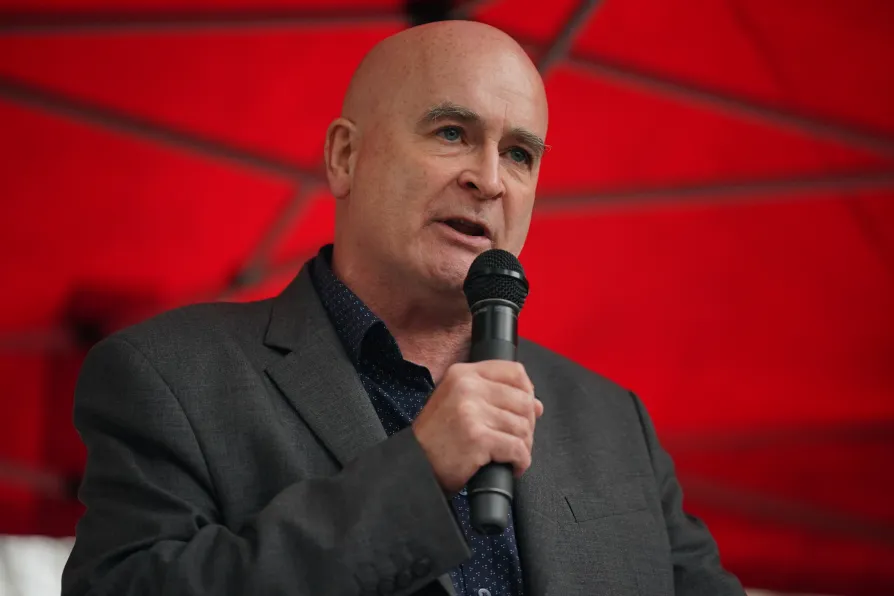The real question for Your Party, as it holds its CEC elections, will be whether shaped from above or built from below by empowered branches and a bold, uncompromising socialist programme. Mel Mullings, Riccardo la Torre and Chloe Braddock of the Grassroots Left slate set out their case

 RMT leader Mick Lynch
RMT leader Mick Lynch
THE TUC special Congress on resisting minimum service level legislation which takes place today could not come at a more critical time for the trade union movement.
The mass strike wave that our union and others played a major role in is still continuing in various sectors and smaller, regional industrial disputes are still ongoing throughout the country.
Although the rate of inflation is not climbing as fast as before, there is still real demand among working people for pay justice in the workplace and a continuing struggle for decent terms and conditions.
Let me be clear — this special Congress has been convened on the back of a very specific and successful composite motion at TUC Congress earlier this year.
That motion was passed overwhelmingly in Liverpool and it stipulated that this special Congress was designed to “explore options for non-compliance and resistance” against minimum service legislation.
This will be essential to our discussions with our sister unions on Saturday.
The Congress will debate a general council statement which we hope will give focus to how we mobilise support for other unions seeking assistance, if their members are sanctioned for engaging in non-compliance during strike action and exploring appropriate industrial responses alongside campaign organisations who are opposed to this legislation.
In the lead up to Christmas when several unions still have strike mandates, including our own on London Underground, government ministers have been stepping up their rhetoric that they won’t allow strike action to disrupt Christmas.
And ministers seem intent on making the legislation live before the festive period begins in order to severely impact strike action taking place.
Importantly the government has left the issue of work notices to the discretion of employers and it will only apply at the moment to DfT mandated train operators, ambulance workers and other groups of workers deemed “key” such as Border Force staff.
It is vital that unions come together to pressure the devolved administrations in Scotland, Wales and the regional mayors to make a pledge never to issue a work notice if there is a breakdown in industrial relations.
Isolating Westminster politically will show that the Tory government alone wants Minimum Service Levels legislation implemented.
The government also has the intention of breathing new life into the agency workers Bill, which was slapped down in the High Court as being unlawful, irrational and unfair.
Putting aside workers’ rights arguments for a moment, it is clear that many employers in our industry and agency companies themselves do not want this divisive legislation on the statute books.
Part of our campaign will be urging employers not to issue work notices as the government has given them a degree of discretion in that regard.
We will be writing to all the employers we negotiate with to call on them not to use the discretionary work notices for the purposes of ensuring a minimum service level.
And if they fail to give us satisfactory guarantees that they will not issue work notices, we will have to consider having industrial disputes with them on that issue.
The government has sought to soften some of the laws to give the impression they are listening to concerns of trade unionists.
This is a red herring as the whole purpose of this legislation is to render effective strike action unlawful, something that has been criticised by the UN agency — the International Labour Organisation.
The ILO’s Committee on Freedom of Association has stated that while minimum service levels can be imposed in certain cases, the extent of the minimum services should not render the strike ineffective or call it into question.
I am clear that when this legislation comes into force it will mean that effective strike action will be unlawful.
I have been equally clear that RMT will not willingly comply with this legislation and will support in whatever ways are practical, other unions who want to engage in acts of tactical non-compliance.
Part of that democratic defiance is to mobilise mass resistance in a national demonstration early next year, with the view to bringing out workers from every community and walk of life.
RMT is demanding Congress calls that demonstration.

Labour’s watered-down legislation won’t protect us from unfair dismissal or ban some zero-hours contracts until 2027 — leaving millions of young people vulnerable to the populist right’s appeal, warns TUC young workers chair FRASER MCGUIRE

Labour must not allow unelected members of the upper house to erode a single provision of the Employment Rights Bill, argues ANDY MCDONALD MP

The Bill addresses some exploitation but leaves trade unions heavily regulated, most workers without collective bargaining coverage, and fails to tackle the balance of power that enables constant mutation of bad practice, write KEITH EWING and LORD JOHN HENDY KC

It is only trade union power at work that will materially improve the lot of working people as a class but without sector-wide collective bargaining and a right to take sympathetic strike action, we are hamstrung in the fight to tilt back the balance of power, argues ADRIAN WEIR









